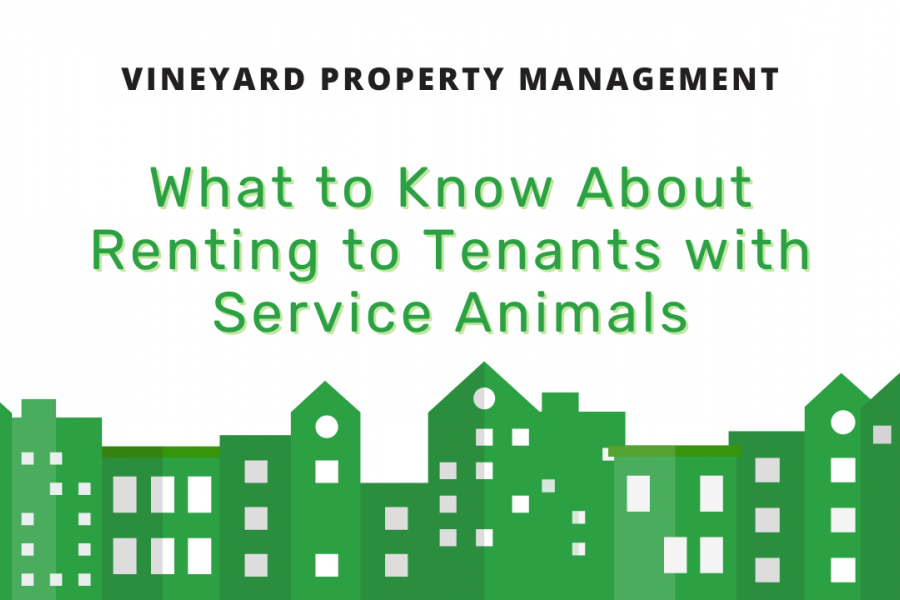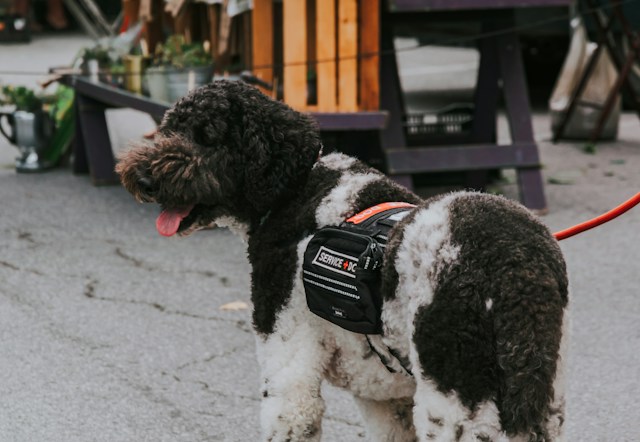
Key Takeaways
- In Georgia, tenants with disabilities have a legal right to live with a service animal, regardless of the property’s pet policies.
- Service animals are not classified as pets, and it’s important to recognize what makes them different.
- To ensure legal compliance, consider partnering with a property management company.
Did you know that tenants with disabilities in Georgia have a legal right to live with service animals even if a rental property has a no-pet policy? Many landlords are surprised to learn that service animals are not legally considered pets. Understanding the difference is important to avoid unintentional violations of state or federal laws.
To help landlords stay informed and compliant, Vineyard Property Management has put together this article explaining what Georgia landlords need to know about renting to tenants who have service animals.
Learn how we can help you maximize your home’s potential.
Understanding Service Animals
What Qualifies as a Service Animal
Under the Americans with Disabilities Act (ADA), a service animal is defined as a dog that has been trained to perform tasks for a person with a disability. These tasks can include guiding a person who is blind, alerting someone who is deaf, reminding someone to take medication, pulling a wheelchair, or alerting and protecting a person having a seizure. In some cases, miniature horses can also qualify as service animals.
It is important to note that service animals are not emotional support animals (ESAs). ESAs provide comfort by their presence but are not trained to perform specific tasks. Because of this distinction, ESAs are not considered service animals under the ADA. Georgia landlords must understand this difference because the rules and rights for each are not the same.

Legal Protections for Tenants with Service Animals
Tenants with service animals are protected under both the ADA and the Fair Housing Act (FHA). These laws require landlords to make reasonable accommodations for tenants with disabilities. Refusing to rent to a tenant because they have a service animal, or applying pet-related restrictions to them, can be considered discrimination.
In Georgia, landlords must also follow guidance from the U.S. Department of Housing and Urban Development (HUD), which enforces the FHA. HUD guidance makes it clear that landlords cannot charge extra fees for service animals and must consider reasonable accommodation requests.
Legal Responsibilities and Limitations
No-Pet Policies and Service Animals
Even if a property has a strict no-pet policy, a tenant with a qualifying service animal must be allowed to live there with their animal. Service animals are not legally considered pets. This means no-pet policies cannot be applied to them. A landlord cannot deny housing or evict a tenant because they have a service animal.
Prohibited Discrimination
Landlords may not refuse to rent to someone, impose special restrictions, or delay lease processing because the tenant has a service animal. Discriminatory actions can lead to fair housing complaints, fines, or legal action. Georgia landlords who violate these protections may face penalties from HUD or civil lawsuits. Being proactive and respectful is the best way to prevent legal problems.
Requesting Documentation Properly
What You Can Ask
Landlords can ask if the animal is required because of a disability and what tasks the animal is trained to perform. If a tenant’s disability is not obvious, a landlord may ask for documentation from a healthcare professional stating that the person has a disability and needs the service animal.

Landlords may also require the animal to be vaccinated and licensed as required by local laws in Georgia. This ensures the safety and health of everyone on the property.
What You Cannot Ask
Landlords cannot ask a tenant to disclose the nature or severity of their disability. They cannot demand detailed medical records or force the tenant to demonstrate the service animal’s abilities. Requiring extra forms or certifications beyond what the law allows can be considered discriminatory. Always keep questions limited to what the law permits and respect the tenant’s privacy.
Learn how we can help you maximize your home’s potential.
Financial Considerations
Pet Fees, Deposits, and Rent
Georgia landlords cannot charge pet fees, pet deposits, or pet rent for service animals. The law views service animals as medical aids rather than pets. However, tenants are responsible for any damage caused by the service animal. A landlord can deduct repair costs from the regular security deposit if damage occurs, just as they would for any tenant.
Insurance and Liability
Landlords should review their property insurance policy to confirm coverage related to service animals. Some policies have breed or size restrictions that could conflict with fair housing laws. If this is the case, landlords may need to speak with their insurance provider to update or adjust their coverage. Ensuring proper liability coverage can protect the property owner while respecting the tenant’s rights.

Managing Tenant and Neighbor Concerns
Addressing Allergies and Fears
Other tenants may raise concerns about allergies or fears of animals. While these concerns are understandable, they do not override a tenant’s right to use a service animal. Landlords can reduce issues by assigning separate units or adjusting schedules for shared spaces when possible. Open communication and reasonable accommodations for both parties can help maintain a positive environment.
Setting Reasonable Rules
Landlords can enforce general property rules about noise, cleanliness, and behavior as long as these rules are applied equally to all tenants. For example, if a service animal damages property or becomes aggressive, a landlord may take action just as they would for any tenant who violates lease rules. The key is to treat tenants with service animals the same as others while respecting their legal rights.
Best Practices for Landlords
Clear Policies and Documentation
Landlords should include clear information about reasonable accommodations and service animals in their leasing policies. Having a written procedure for handling service animal requests helps avoid misunderstandings. Documentation should be stored securely and only shared with authorized staff to protect tenant privacy.
Training and Awareness
Property managers and staff should be trained on the laws and responsibilities related to service animals. This includes knowing what questions are appropriate, how to handle accommodation requests, and how to respond to complaints from other tenants. Staying informed about fair housing laws in Georgia helps prevent legal issues and supports a respectful rental community.
Bottom Line
Renting to tenants with service animals requires understanding and following federal and state laws. Georgia landlords must allow service animals even in no-pet properties, cannot charge extra pet fees, and must avoid asking inappropriate questions about a tenant’s disability. By requesting documentation properly, handling tenant concerns respectfully, and keeping policies up to date, landlords can stay compliant and maintain a positive rental environment.
Vineyard Property Management can help landlords in Georgia manage these responsibilities with confidence. Our team stays informed about housing laws, handles accommodation requests, and ensures all tenants are treated fairly. Contact Vineyard Property Management today to learn how we can help protect your property while keeping your leasing process compliant and stress-free.
